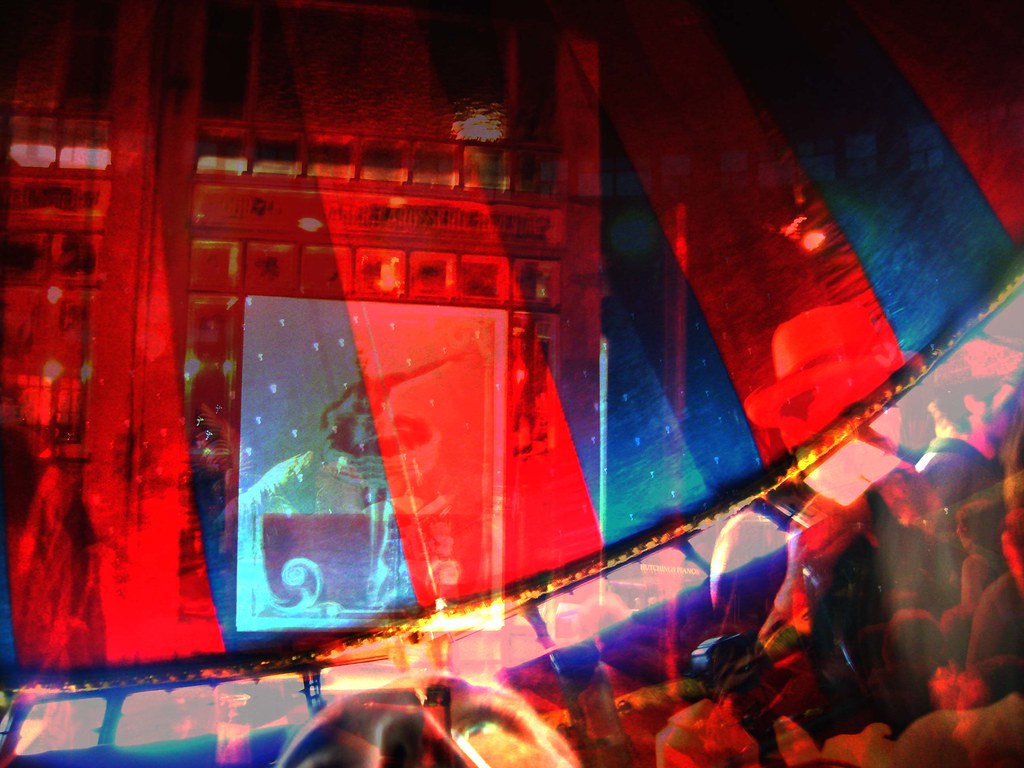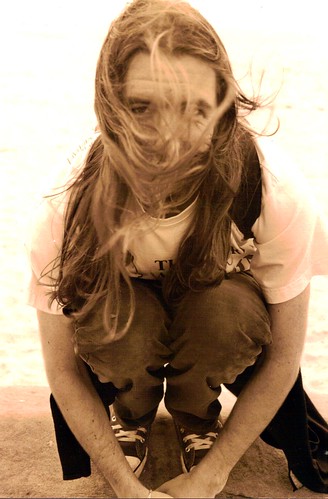The next wolf-infused chapter of The Music Box is almost ready, but I’ll stall for the time being with a wolf-themed link to ‘La Blogotheque’, a French music weblog with rather fine tastes.
They’re using a photo I took at the Iron and Wine show earlier this year in talking about Sam Beam's wonderful Wolves (Songs of the Shepard’s Dog), as part of an article about the Wolf in popular music.
I’m pleased to see they made mention of Bonnie Prince Billy’s stellar Wolf Among Wolves, and of course gave thought to the darkly delightful Wolves by The Accidental.
Well, here it is...
Wednesday 13 August 2008
Friday 8 August 2008
Vinyl Diaries XXX: Sigur Rós

Sigur Rós
Hordern Pavillion
August 2, 2008
I faced a small dilemma in even coming tonight. So perfect was the last Sigur Rós show I saw, so rich and detailed and finely hewn, it seemed it would be tempting fate too sorely to expect such an experience again. And yet if it was too similar, relied upon the same buttons being pushed, even that would disappoint in its hint of stasis.
I needn't have fretted so.
It was a chilly night it's true, but I doubt the Hordern Pavilion had ever hosted such a natty collection of scarves and woolen hats. We Sigur Rós people seem, it turns out, to be scarves and woolen hat people. Either that, or the chilly, glacial scope of their music subliminally works its way down to our bones and it's not so much a matter of predisposition as self preservation.
The audience was younger, too, than I recall. Yet this seems fitting for Sigur Rós' regressive trajectory, their swim upstream back from life's very precipice, wisdom gained and the end stared in the face, before they turn, quietly, walking away from the light, from nothingness and weightlessness towards that first moment of wonder, of childish glee at the colours and sensations and incomprehensibility of all that simply is.
The stage lit only incidentally, the band emerged from the wings, regally attired and positively glowing. What would they start with, how would they set the tone? Judging by the response, the opening submarine 'ping' of Svefn-g-englar was the perfect choice for many, the ideal entry-point for our magical mystery tour.
There is something inexplicably hypnotic about that depth-sounding 'ping' that carries us through helplessly, wisps us away from our firm grounding and takes us on a submarine meander beneath the ice floes. The water outside is so cold it loses its miscibility, twirling in a slow dance that leaves oily outlines against the portals; sea monkeys gazing idly back as we journey who knows where.
Kjarri Sveinsson's organ carries us along until the first of those sweeping, bottomless cello bowings across Jónsi Birgisson's electric guitar brings in turn the night's first shivers, the sky above splitting wide open (ignoring for the time being the minor matter of the roof in-between). His singing, the untethered Hopelandish wail that hovers high but unforced, flies out in clear soaring lines, before the drums, reliable until now, suddenly stutter and the whole precarious puzzle tumbles into its own icy undertow, which we only now realise had been there all along, shadowing every step.
Just as it all begins to fade away, Jónsi's voice, not so much dominating as increasingly holding a certain sway, breaks out - an impossibly long, sustained note, a siren call we can't help but follow; if we perish, so be it. We catch our breath in consort, waiting, waiting, and still it holds. This is no smoke and mirrors, it reminds us, this is the outer limits of the possible, being pushed that little bit further than we ever knew they could.
Finally, with gasping relief, we surface at our first secret destination, the frightfully graceful picnic spread of Glósóli. Treats beyond our wildest imagination are spread as far as the eye can see, and we gorge on creamy sugared treats beneath fluttering coloured flags catching the cliff-top breeze. Jónsi's every slicing bow guitar peals off a reverberating sliver of live electriciy, racheting the tension notch by notch.
Only two songs in, and the rest of the world is forgotten. Even the very constructedness of what we're seeing and hearing melts away – there is such a seamless, intuitive communication in the band's musicality that they rarely become themselves; they are already and always Sigur Rós.
The joyous innocence of Sé Lest is a striking follow-up, all music box melody and tinkering toys taking on a life of their own, our Icelandic elves playing percussively in a magic toyshop overflowing with beautifully hewn trinkets and wide-eyed whimsy.
Such is the inspired flight of imagination that when they reached the moment on the album at which the horns in Sé Lest enter, it seemed as though a marching band has appeared on stage, crisply dressed in flawless white, gold tasselled and chiming in to perfection. We pictured them marching across the stage for the short passage and then simply evaporating, leaving us wondering if such a preposterously perfect occurrence had been nothing more than a collective wish and melding of memories rendered momentarily material.
When the brass playing foursome The Horny Brasstards did return to the stage for Ný batterí, it appeared that they must, after all, exist.
There is a space or dimension that exists uneasily between the childish reverie of the voyage of discovery and those midnight phantoms that are its flipside; wonder and terror two facets of the same experience. It’s through this slippery netherworld the goodship Sigur Rós sails, charting new territories while laying their faith (and we ours) in the stars.
Originally drawn to the drama, the mysterious romanticism of these vast Icelandic soundscapes, it's been a perilous but rewarding journey to follow Sigur Rós into newer territory. Takk managed to balance the grander, sweeping statements of ágætis byrjun and ( ) with some more optimistic, concise tracks and consequently benefited from the breath of fresh air.
Their fifth full-length album með suð í eyrum við spilum endalaust ("with a buzz in our ears we play endlessly") has continued further down this vein, stripping away the layers and exposing the skeleton within.
Though breaking with their signature strengths, this immediacy and intimacy is not entirely unwelcome. The conciseness and precision serves two purposes, both on show tonight. The first is breaking up the longer, swirlier pieces, providing some calm against which the storms appear to reach even greater heights.
The second and perhaps most important for their longevity is to reveal a little more of themselves. Counter-intuitively, the more we're faced with ceaseless doom-laden ice-castles in the sky, reverb-soaked end-of-time crescendo-driven epics, the less we believe in them. But when more austere works such as the joyous lilt of Hoppípolla are neatly juxtaposed with the more brooding works, we feel we're witness to a truer picture, a more multi-dimensional wholeness that makes the peaks and troughs all the richer for their surprise and intensity; it more closely reflects life and we sense they truly mean it, that they aren't simply going through the motions.
It is these moments of light that made it so deeply unsettling when Jonsi drove his bow to destruction during Ny Batteri and made set highlight Festival all the more bewitching.
There were times at which I missed the strings, those curious imps Amiina who so delightfully lent their talents to fill out the more pastoral pieces on previous tours. Without them there are moments in which we miss the delicacy, the lightness of touch and the revelry of the incidental.
But the horns played their role superbly and made for a worthwhile deviation. They are offered up with a deft touch, made to shimmer and vibrate rather than honk and puff. This helped to add a sense of subdued desolation, the fog rolling over us from the sea and enveloping our thoughts and very being.
Something I also realised tonight that doesn't jump off the albums at first listen, but is in retrospect quietly buried there, is the integral role of the rhythm section in anchoring Sigur Rós, keeping them from drifting away into pure ambient wallpaper. Orri Páll Dýrason's drumming is tight and disciplined, a clock-work reliability to its machinations, while Goggi Holm's bass is restrained, yet highly fluid. It's sensual, yet not solipsistic or romantic, slinking just beneath the radar but leading us along all the same.
They know when to catch, and when to release. Simmering away imperceptibly beneath Sæglópur, biding their time during the gentle piano opening and as Jonsi's vocals weave in with the bright semi-hopeful chords, they let the more melodic elements dance merrily for a while, before gatecrashing with fearful power. They trigger a violent reaction in turn and before we know it searing strips of molten electricity are torn off the guitar, Jonsi's previously measured voice now hauntingly plaintiff, drowning in a sea of pain.
Inní Mér Syngur Vitleysingur offered a brief respite, a few rays of sunshine breaking through, but they were soon snuffed out by Hafssól and its relentless bow-shredding menace and ache.
After this exhausting and troubling intensity one wondered what could be pulled out next, and set-closer Gobbledigook was a startling but contagiously joyous choice. The subdued stately hues that had been the provence of the simply-lit stage throughout the night were shaken off for a clap-driven kaleidoscopic rainbow, an eruption of playful chords, acoustic guitar scratchiness and major-key celebration. 'La-La-Las' were spilling from every corner of the stage, the song and set climaxing with a snowstorm of confetti bursting forth like the joy bursting from thousands of hearts.
It was such an uplifting, surprisingly unmisanthropic finish to the main set that we were all the more disarmed by what was to follow after a brief break, the harrowingly destructive Popplagið that stood as the first encore.
Opening gently enough, that rarest of Sigur Rós devices - a guitar riff - lulls us in and draws us along without too much caution. It’s a touching little riff, minor and almost apologetic, but it’s hummable and sneakily draws us into the dark heart that opens around us before we realise.
Coddled by an equally unthreatening bass, it’s not until we’ve wandered far too far into these verdant woods that we hear the first thunderous clap, the distant rumbling storm rearing its unsettling green head upon us. But then it eases and we laugh at ourselves - 'jumping at shadows' we knowingly smile.
And yet... those drums. They’re building. The Horny Brasstards have laid down their brass and taken on drums, pounding them with increasing fervour, banging away in primal synchronicity.
The Sigur Rós entity soon lets out a sigh. It's not simply ghostly, not merely a dream - it crosses over into a ghostly dream, thrashing on and on mercilessly into a phantasmagoric nightmare. On and on they push, a raw, draining, eviscerating exorcism that seems to have no end, until, finally, it peaks, spills over, topples forward in a frothing surge. Desperately, sinking sinking, you cling onto some passing flotsam, chewed up, spat out, exhausted - exhilarated. Shivers run through your skin, then you shed it, soar above, looking back down upon the spent shell.
At this point they could have left us, battered, bruised and broken, to wander off into the night. It was the kind of transcendently majestic rock finish that stays with you in tingle form for days, so it would have been tempting to send us off with its aftershocks still washing over us.
But, perhaps a little wary of just what frame of mind that might leave us in, Sigur Rós returned for a final time to bring us back to earth, wrapping us in the quiet embrace of All Alright. This sweet, pretention free lullaby brought us down beautifully, not so much anti-climactic as rejuvenating; a gentle butterfly wing on the cheek to wish us well along the long and winding path ahead.
Subscribe to:
Posts (Atom)

